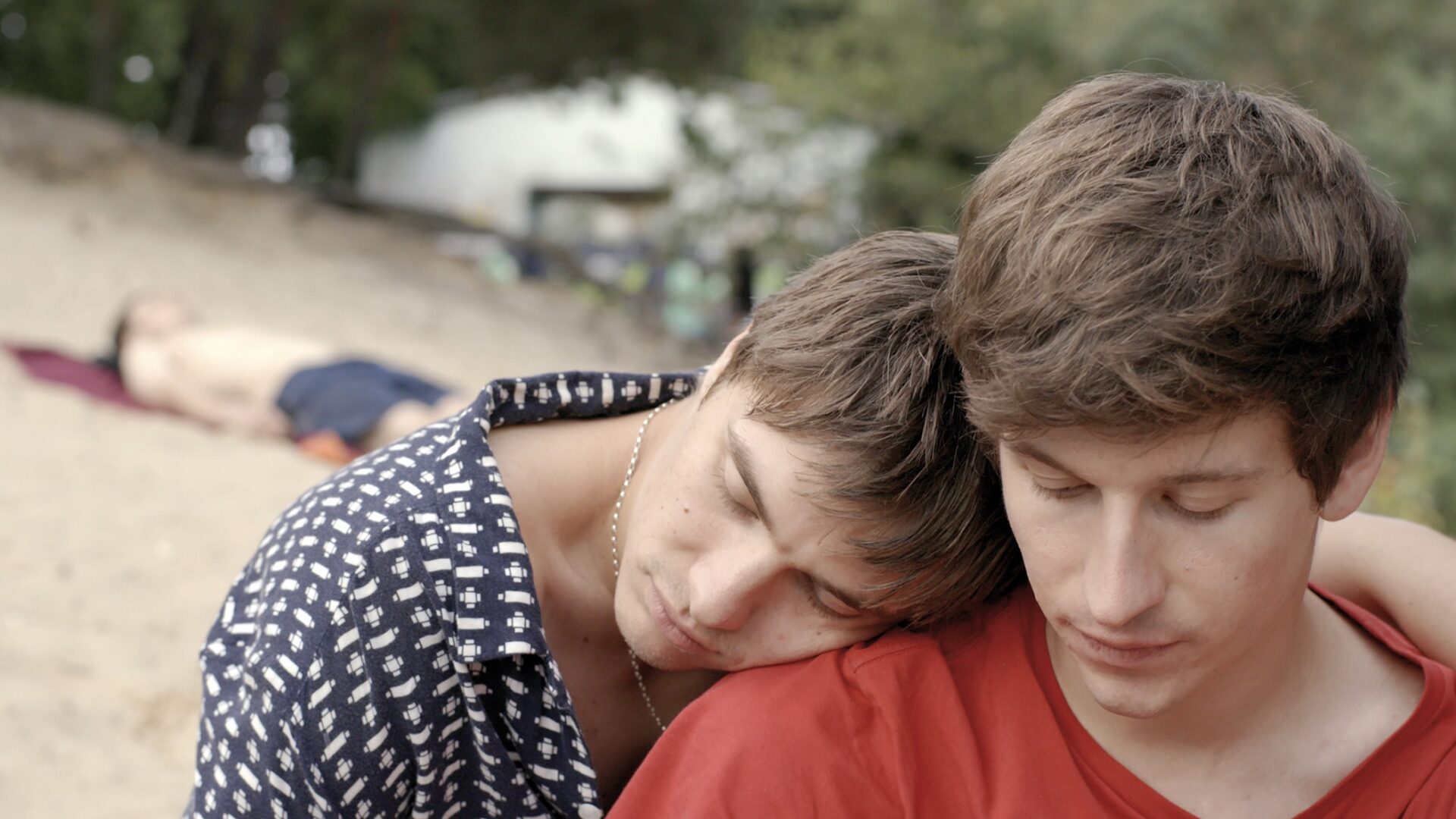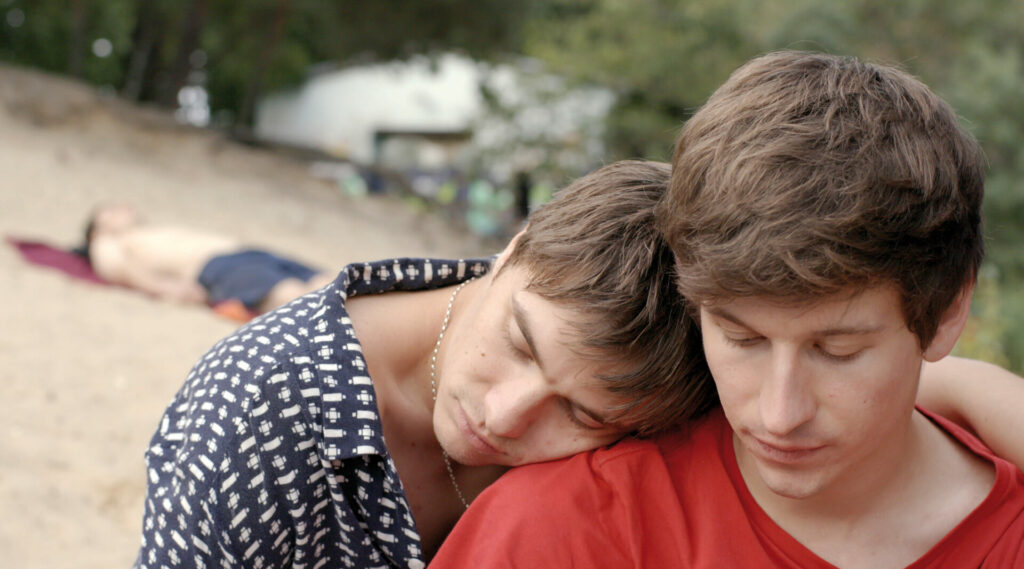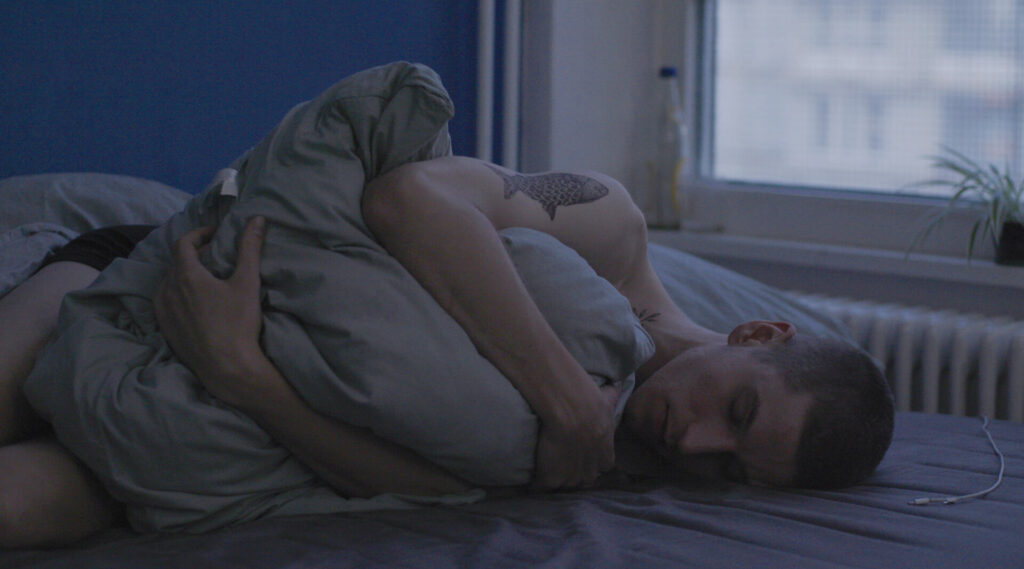BFI Flare: Drifter creators on bringing Berlin’s gay scene to life
Drifter is the closing night film of BFI Flare on Saturday 25 March.

The creators of Drifter have discussed what it was like bringing the iconic gay scene of Berlin to the big screen.
Drifter, the story of Moritz, a young gay man new to the German capital, sees the character go on a journey to discover who he really is after his relationship falls apart.
Along the way, Moritz, initially firm in his identity as a gay man, experiences new and interesting encounters as he immerses himself deeper with life in the big city.
Relatable in its focus on the discovery of identity, the film was born out of the mind of director, producer, and writer, Hannes Hirsch. Along with the film’s co-writer, River Matzke, Hirsch has crafted an authentic portrait of queer life and culture.
The film is also closing the 37th edition of the BFI Flare LGBTQIA+ Film Festival on Saturday 25 March. Speaking to Attitude ahead of the film’s debut at BFI Flare, Hirsch and Matzke opened up about Moritz’s journey and bringing Berlin’s queer scene to life.
How does it feel to be closing BFI Flare?
HH: Very nice. I mean, especially now that we’ve been here a week and have seen so many films that we feel that these films have been very well curated. It’s really a nice selection. Each film, you can feel why this film has been selected. And, of course, BFI flare has some prestige. So, we’re very happy, especially to be selected as a closing film.
RM: Yeah, I agree. I really appreciate BFI Flare for having strong curating personalities, I think you can sense it in the programme. Each film is very specific and a world on its own. I’m really excited, and also very humbled to be able to do the closing because it’s such a long tradition of great British cinema, of world cinema [it’s] such a tradition that we step in. When there’s doubt, I just tell myself that I trust the curators in their choice, just like I like the other choices, and then that’s kind of soothing. I’m really looking forward to it. It’s amazing. It’s such a crystal of the British film industry. Really, it’s such a privilege.
HH: And after having the premiere at Berlinale which was nice. Panorama, the section where the film was shown, is traditionally a very queer section. But now showing this film in London, to a different audience, of course, because the film is talking about nightlife in Berlin, or growing up as a gay guy in Berlin, how this is perceived in London, and maybe the reactions, maybe they’re a bit different. I’m very curious for the Q&A.
RM: I think it’s going to be interesting, because I already talked to some people at the festival about our film and what we’re doing about gay trauma, and internalised shame, and so on, and many people can relate to that. And they actually react pretty emotionally, because almost like every second person that I talk to, they have a story of someone from Berlin, who has gone to Berlin and who went down the rabbit hole, they lost someone, and so on. So it seems to be a topic around here, at least with the filmmakers which is pretty exciting.
I don’t know anyone who’s not gone to Berlin and explored the gay scene a little bit at least. Where did the idea for Drifter come from?
HH: I was writing for a longer period of time on little stories that I have seen in Berlin, but also in other cities in Europe. People that somehow stuck in my head or little situations that I wanted to make a story out of them because when you put these little things in a story, somehow they get a meaning. You can find out a bit about what they mean for the people. Why did they do this? What does this maybe lead to?
Then I tried to connect all these little things and then I wrote the script for a longer time. At one point, we [River and Hannes] met in Greece, and I read the whole treatment to River. Since then, you helped me first in designing the whole outline of the story, making it a bit tighter. Then, in the end, you were working on the dialogue. Now, all these little stories that I have seen somewhere went into the film, but in the end, everything is built up. It’s not like this person that really exists.
RM: Yeah, I think you approached me with the story at a stage where it was still pretty different. And then we worked on themes and characters and a bit on the psychology and made it more three-dimensional, and also developed the psychology of the protagonist. People always tend to think that autobiographical writing is really easy and something that you can just do because you know your own life. But autobiographical writing is actually extremely hard, because you have to know your characters very well. You also have to know yourself very well. So, we were exploring some of the worlds that were already in there and taking a clearer view, I think that you can only have when you work with someone who’s on the outside.
HH: And it was important for me to bring some things onto the screen. Because when you are in an audience, and you see something happening, and there are like 300 people sitting in a cinema watching the same thing, in the end, they will discuss it and you get some distance from it. I really tried to put many things into the film that I haven’t seen like this already.
The idea of going on a journey to discover your identity is very relatable to most people. How do you two personally relate to the character of Moritz?
HH: I can say for myself, I think all the different stages that Moritz goes through I can totally relate to them but I can also relate to any of the other figures. For me, it was important to also somehow understand and also show in a kind way the bad sides of the character, that we don’t really judge him when he’s doing this or that because all the people, they do these things for a reason, and I try to give some clues in the film, like why maybe some person reacts in this or that way. And this was always important for me. Sometimes I’m this person of Moritz. Sometimes I’m the other one.
RM: For me, it has many different dimensions. We tried to create a protagonist who is also ambivalent and develops some character traits that are not necessarily what you would perceive to be kind or good in a way because the gay scene is also very toxic, there are so many projections and so much fragility, and hurt that is being pushed away. And then, of course, you are also mean or passive-aggressive toward other people. For me, the film is very personal also, even though it’s not my story. It’s also not specifically Hannes’ story, but because of all these themes and topics that weave into the film, because it has been created within our community and our subcultures.
So, the fashion and the music and the interactions, all of that is very personal. And then for me, my gender changed a lot while we developed the screenplay. I developed more into like a trans-feminine non-binary identity. So, the film was really important because I could see it from the inside and from the outside. And then having these more, more fun-dominated spaces and more focused on maybe care, self-care, or healings with a group of friends, are the very personal aspects for me. And it was also like, digesting the gay man that I had been before. So, it also became a personal feeling for me in the end.

Moritz ends the film in a very different place and state of being from where he starts. How much do you think he as a character fundamentally changes?
HH: That’s a question: how much can a character change? And also, what creates the change? Firstly, he changes on the inside and then he changes on the outside, but maybe it’s also the other way around. How much do you just pretend to be someone else at first? But then in the end, you just become this person that you’re always pretending to be. In the last shot, you see Moritz sitting in a car like you’ve seen him before. I’m not convinced that people in a film must change completely.
RM: When we worked together on the screenplay, we tried to show different forms of transformation. And I think also in the editing, we also brought different steps of Moritz as a person. I think, for me, personally, he’s not really a different personality, it’s just that his insides are being put out more. And it feels like maybe he’s often a people pleaser, which I think is also a very gay thing to be in the end of your teenage years, or your early 20s. And once he starts to experiment with himself, the more we can see the rougher edges of his person, which I personally find pretty relieving.
HH: Sometimes when you live in a queer scene in a bigger city, you meet one person again, after two years, and you’re like, ‘Oh, my God, is this the same person that I met two years ago?’ And also to bring coming out as a change. In this film, we show a second coming out, maybe people have a third coming out.
Wanting to tell a story set in the gay scene of Berlin, was there anything that you really wanted to show in particular?
HH: When you see a film, and it’s clear where the film is set you are a bit thrown when you recognise some locations, but then they don’t make sense geographically. So I tried to give this feeling of Berlin but not too much orientation. Many of the clubs in the film don’t really exist. It was just behind some warehouse and we put some colourful lights and it looks like a club.
RM: It was very important that all the artwork in the film, the fashion, the music, the acting, and the interactions felt real. I did lots of serial writing before where there’s often this heightened reality and it’s a little bit artificial in a way. But this is the life that we are living. So it was very nice to be able to write everything in a way that I just experienced in our subculture. I think it’s important to show that nightlife is not the big freedom, like this utopia, but then it’s also not this dark [thing]. It’s our way of living, and to be able to portray that in an honest way. I think was really, really important.
Would you consider continuing Moritz’s story at all and seeing where else the journey goes?
RM: We said that maybe we want to work a little bit more toward the topic of community.
HH: Yeah, this community that we are criticising a bit but also celebrating is something I would like to continue to work on.
What was it like striking that balance in terms of celebrating and criticising the community?
HH: Sometimes during writing, but also in the editing, sometimes I felt; ‘Fuck! Are we making a film that shows a nightmare? Is it too dark? Is it just a celebration of a party?’ which I also didn’t want to do. The use of music added a lot. For example, there’s this big dancing scene under the shower. We always had some very happy music. But then we found this track that made it more of a sad scene.
RM: What I like about this scene is it’s got this physical attraction, the music is so attractive, and you really want to be part of it, and you want to be under the shower with them. But still, some of the characters have been also tremendously hurt before. This is a feeling that I have in Berlin nightlife often, that you can’t really jump out of it. You are attracted to everything that’s going on there. And you’re part of it, but then still there is hurt and there are ambivalences.
HH: What I wanted to transmit is that all these things are quite complex, there’s not a simple answer. You have to really look at everything. Like, let’s talk about drug use, or drug abuse, for example. It’s not a simple answer how you can answer this question. Or going to the gym and having the hottest, most muscular body is also very ambivalent.
RM: Yeah, there are such fine lines to navigate. Every single time that a drug is used in the film, that changes something about what you want to say about that. Or like all different sexual encounters, we also talked a lot about sex positivity and sex negativity, because it was very important for us to have sex-positivity in there. But then also you have to criticise like the body norms and some of the dark psychological stuff that is going on around gay sexuality, but then you don’t want to make a film that is really negative about that. You want to do something positive and empowering, but you don’t want to run through the image with a rainbow flag.

What do you want people to take away from watching this film?
HH: I mostly made this film to also get reactions from people. I wanted to bring up a discussion and hear what people think about it. Of course, I have my own ideas and opinions. But I made this film to contribute to a general discourse about these topics and to make people talk.
RM: I can’t really say what people should take away from it. People can decide by themselves. I’m just realising that part of making the film was to make this scene, our life, part of reality. Part of what is being discussed socially. Nightlife has always been a big part of queer life, and there are not enough films about it yet. It always tends to be seen as: ‘We have fun and then we come back home’. It’s a vessel for the community and how we develop and come together. It’s really important it becomes valid in a way where there’s a film about it. That it’s relatable.
You’ve shown the film in some other places besides BFI Flare. What has the response has been so far?
HH: In general, very good. People really felt seen. And this is something I really like. Then also, some people react quite allergic to the film. Maybe the film hits something in them their personal life. I’m curious to see how the film ages also.
RM: The reactions at the Berlinale were more emotional than I would have thought. I thought we were criticising a lot. People actually really felt seen by the way that we discussed trauma and intimacy and so on. The film is not a very emotional, dramatic film at its core. But it seemed to really touch people on an emotional level. And this is something that I hadn’t expected at that intensity. And that was really nice to get that back from your own community.
Drifter is screening at BFI Flare on Saturday 25 March at 6:40pm in BFI Southbank’s NFT1.
